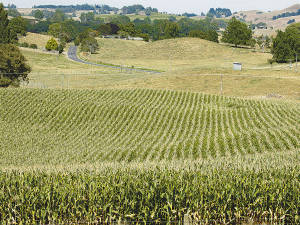Hitting heifer liveweight targets
Early December marks a key transition for many dairy farmers, as weaned replacement heifers head off-farm to grazing.
 Plant breeders and researchers continually deliver new hybrids that can handle the increasing challenges the environment seems to throw at us.
Plant breeders and researchers continually deliver new hybrids that can handle the increasing challenges the environment seems to throw at us.
OPINION: I am a maize tragic. While that may come as a surprise to some, those who have read this column over the last few years will know exactly where I am coming from.
I absolutely love maize. I have been involved with the maize industry and have grown maize on our own account for nearly 25 years. Yet each season I discover something new about maize and I have an even greater admiration for plant breeders and researchers who continually deliver new hybrids that can handle the increase challenges the environment seems to throw at us.
This has been particularly true this season. At home, near Hamilton, we had just 6mm of rain from the 15th of December to the 6th of February when we received 75mm of rain over two days. Before the rain, some areas of our maize were showing severe drought stress, while other places were "just hanging in there". When it was dry, I avoided walking through the crop as it was pretty depressing watching the plants suffer. However, since the rain, I have walked my crop and I am amazed how well it has come through this long period of little rain. I put this down to three things:
Plant genetics
In previous articles I have talked about maize's high water use efficiency (WUE) which is about three times that of ryegrass. This means for every litre of water available, maize produces three times more dry matter than a perennial ryegrass paddock. Maize, a C4 plant like kikuyu or paspalum, is inherently water efficient but drought tolerance has also been a key focus of maize breeders. A few years ago, the team at Pioneer introduced the AQUAmax designation for some of our hybrids. For a hybrid to qualify, it needs to meet certain criteria for performance in water-restricted environments. Over the last few years, we have planted P9911 AQUAmax® at home on our light sandy loam soils. Nearly every year it has more than met our expectatins despite the challenges our growing environment throws at it.
The right management for our growing environment
I am a dairy systems specialist, not a maize agronomist. We grow maize ourselves on dry, sandy soils. When we first started growing maize, we did what our maize growing friends did. We never had a crop failure but some years our profitability wasn't as high as I wanted it to be. It took us some years to realise that our repeat cropping ground on dry soils was not the same as our friend's high fertility ash or peat paddocks with better water holding capacity.
My colleague, Barry McCarter (maize product manager for Pioneer brand seeds), talks about the "Right Product under the Right Management planted in the Right Paddock". With support from Pioneer's agronomy team, we shortened up our hybrids from a longer 113 CRM hybrid to P9911, a 100 CRM hybrid, altered our plant populatin to better reflect the growing environment and reduced our fertiliser input by 200kg urea/ha. Now we produce consistent yields with higher profitability and our system is more environmentally friendly. The take home message is to get the right advice on the right management and the right hybrid for your paddock.
Our contractor
The contractors you use is also important. We have worked with the same contractor for the whole time we have grown maize silage. Each year he goes out of his way to do the best job he can for us. By doing the job well and mostly on time, he helps set us up for success. This year the wet weather meant it was tough to get seed in the ground at the planned time. The contractor's team not only kept us up to date with where they were at, but they worked long hours when the weather was good to try and catch up.
So, if you are thinking about growing maize, I would encourage you to go ahead and do it. And then you will experience for yourself the wonderful plant that is maize.
Ian Williams is a Pioneer maize specialist. Contact him at This email address is being protected from spambots. You need JavaScript enabled to view it..
The World Wide Sires National All Day Breeds Best Youth Camp Best All Rounder plaudit has become family affair, with 2026 Paramount Cup winner Holly Williams following in her sister Zara's footsteps.
DairyNZ is giving New Zealand farmers a unique opportunity to gain hands-on governance and leadership experience within the dairy sector.
Herd improvement company LIC has posted a 5.2% lift in half-year revenue, thanks to increasing demand for genetics.
According to the latest Fresh Produce Trend Report from United Fresh, 2026 will be a year where fruit and vegetables are shaped by cost pressures, rapid digital adoption, and a renewed focus on wellbeing at home.
The Roar is a highlight of the game hunting calendar in New Zealand, with thousands of hunters set to head for the hills to hunt male stags during March and April.
OPINION: The past few weeks have been tough on farms across the North Island: floods and storms have caused damage and disruption to families and businesses.
OPINION: Fonterra may be on the verge of selling its consumer business in New Zealand, but the co-operative is not…
OPINION: What does the birth rate in China have to do with stock trading? Just ask a2 Milk Company.